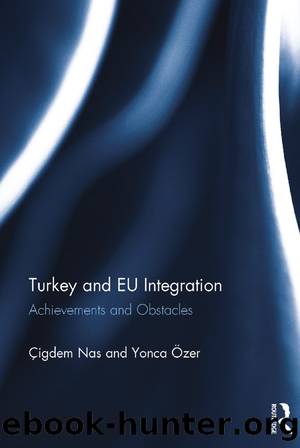Turkey and Eu Integration: Achievements and Obstacles by Çiğdem Nas

Author:Çiğdem Nas [Nas, Çiğdem]
Language: eng
Format: epub
Tags: Political Science, General
ISBN: 9781317006046
Google: OCAlDwAAQBAJ
Goodreads: 35193761
Publisher: Routledge
Published: 2017-05-18T00:00:00+00:00
Notes
1Most debate regarding democratization processes has been between two internally oriented mainstream approaches, which are structural and agency-based approaches. While the former focused on socio-economic trends and presented democratization as arising from economic modernization or particular changes in social and class structures, the latter claimed that the democratic transitions of the 1980s could be best attributed to the agency of domestic actors (Youngs 2001: 3).
2In addition to conditionality, contagion, control and consent are conceptualized as international factors in order to understand the complex processes of democratization (Schmitter 2001: 30; Whitehead 2001). The âdiffusion effectâ as used by Linz and Stepan (1996: 76) or âcontagion through proximityâ as used by Whitehead (2001: 5) occurs when neighbouring countries pursue a process of political learning from the successful steps of each other. Thus, a transformation starting in one country triggers another in its immediate vicinity. While Samuel P. Huntington (1991) describes the same phenomenon as a âsnowballing effectâ, Jean Grugel (1999: 33â41) employs the term âsocializationâ. Whatever the term employed, the concept refers to one of the possible ways that international factors exert influence over democratization processes through the diffusion of Western values emphasizing individual rights, liberties, pluralism and a liberal market economy. These socialize domestic actors into adopting certain strategies and models invented and developed outside the domestic realm. Another international mode of democratization, âcontrolâ, refers to the explicit policies, actions and motivations of external actors to bring democratic regimes to other parts of the world through causing splits within the authoritarian regime and supporting those who are more in favour of change and democratic reform (Whitehead 2001: 8â15). The final international democratization factor of âconsentâ refers to the roles and motivations of strategic domestic actors in adopting external values and institutional mechanisms that constitute the core of a democratic regime. To implant a long-lasting and stable democratic regime, the active and voluntary participation and support of a wide range of groups and actors have to be obtained and maintained (Whitehead 2001: 15â16).
3For example, respect for human dignity, freedom, democracy, equality, the rule of law and respect for human rights of persons belonging to minorities.
4The Copenhagen criteria consist of three parts: political criteria (stability of institutions guaranteeing democracy, the rule of law, human rights and respect for and protection of minorities); economic criteria (the existence of a functioning market economy as well as the capacity to cope with competitive pressure and market forces within the Union); and adoption of the EU acquis (ability to take on the obligations of membership, including adherence to the aims of political, economic and monetary union).
5For the Helsinki criteria, see Paragraphs 4 and 7 of the Helsinki European Council Presidency Conclusions.
6See Paragraph 25 of the Luxembourg European Council Presidency Conclusions.
7This assumption was put forward as an âexternal incentives modelâ based on rationalist institutionalism.
8The benefits of membership are generally associated with socio-economic advantages, welfare, security and international legitimacy, while the costs of compliance with conditions may include more limited national sovereignty, revival of ethnic consciousness among some ethnic minorities and economic and financial losses from compliance.
Download
This site does not store any files on its server. We only index and link to content provided by other sites. Please contact the content providers to delete copyright contents if any and email us, we'll remove relevant links or contents immediately.
The Trial of Pierre Laval by J. Kenneth Brody(205)
The Theory, Practice, and Interpretation of Customary International Law by Panos Merkouris Jörg Kammerhofer Noora Arajärvi(198)
An Inquiry into the Nature of Peace and the Terms of Its Perpetuation by Thorstein Veblen(195)
Uncertain Justice: A Legal Thriller by K. Ryan Kerry(189)
Putting the Tea in Britain by Les Wilson(184)
The Medallion by Alan P. Woodruff(184)
Transnational Crime and Criminal Justice by Marinella Marmo Nerida Chazal(183)
International Criminal Law in a Nutshell by Stewart David P.;(183)
Rethinking Nordic Courts by Laura Ervo; Pia Letto-Vanamo; Anna Nylund(183)
Underwater Cultural Heritage and International Law by Sarah Dromgoole(179)
Law Beyond the State by Carmen E. Pavel(175)
HPCR Manual on International Law Applicable to Air and Missile Warfare by Program on Humanitarian Policy and Conflict Research at Harvard University(174)
A Farewell to Wars: The Growing Restraints on the Interstate Use of Force by Hans Blix(171)
The Rhetoric of Genocide by Ben Voth(167)
Otto, Roland - Targeted Killings and International Law With Special Regard to Human Rights and International Humanitarian Law by Springer (2009)(164)
The Limits of International Law by Jack L. Goldsmith & Eric A. Posner(162)
The Despot's Guide to Wealth Management: On the International Campaign Against Grand Corruption by J. C. Sharman(159)
Trafficking Justice : How Russian Police Enforce New Laws, from Crime to Courtroom by Lauren A. McCarthy(156)
The Law of Non-International Armed Conflict by Sivakumaran Sandesh;(143)
